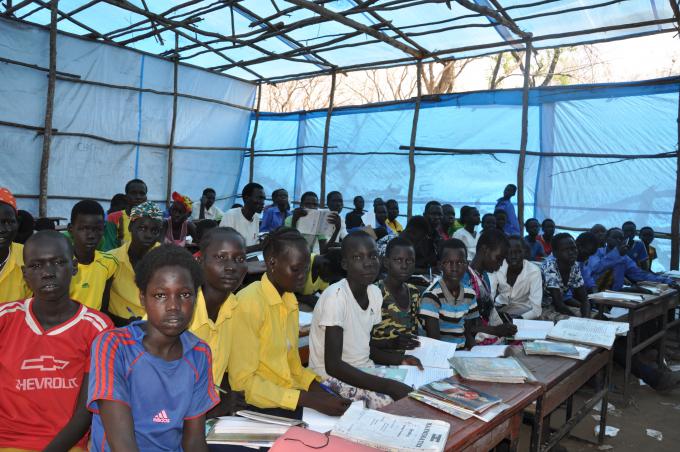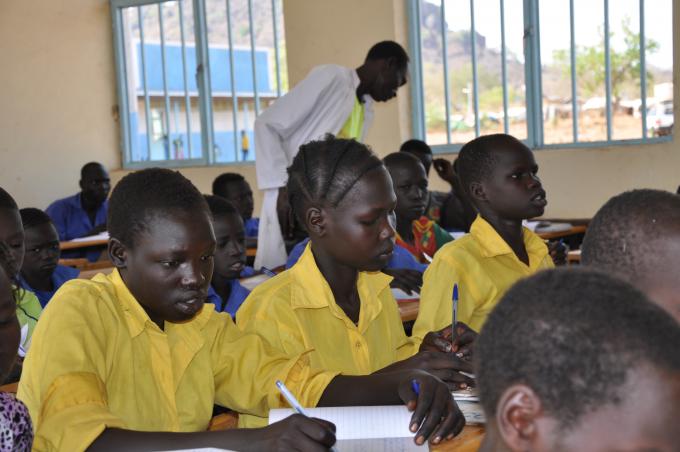Provision of education in refugee camp improves lives of ex-child soldiers
When South Sudan attained its independence in July 2011, after decades of devastating civil war, many hoped that to be a new beginning and a bright future for the children of the new country. But that new day never came; the hope didn’t last even for a couple of years.
Children and women are the primary victims who suffered a lot because of this conflict. Many school children aged, only 12 and 13 years old, have joined the conflict as child soldiers.
Chol Deng*, now 17, was only 14 years old when he joined the fight to avenge the death of his elder brother and relatives. He stayed in the conflict for three months. “During these times I have seen a lot of things I can’t express in words; I have seen too many deaths that are horrible to remember”, Chol says.
But it was only when the war had escalated and the adversary forces overwhelmed Chol and his friends that they abandoned the fight and escaped through the bushes and swamps to the Ethiopian border. He was stung by a snake in his way to the border.
The challenge for Chol hasn’t stopped even after he joined his aunt in the Refugee Camp, in Gambella, Ethiopia though. The nightmares of the war during the night and the daunting thoughts of returning back to the “field” during the day had threatened his future again.
When Save the Children and its partners opened learning centers in the refugee camps, Chol registered and started to learn there. The diversion of his attention to his education and the continuing support from his teachers helped him forget the past and focus on his future.
Teachers support students to recover from the devastating conflict by providing them life skills trainings besides the formal education they are attending.
“I have now forgotten the idea of returning back to the fight.” Chol says. “The school life had changed my life in a way that I haven’t expected; I want to continue my education and change my life for good” he adds.
Save the Children, with the support from the European Commission Humanitarian Aid and Civil Protection (ECHO) and Comic Relief under the program “Learning beyond borders: Providing education to refugee and displaced children and youth in South Sudan and Ethiopia”, is providing the necessary supports to the refugee camps school centers in Gambella.
It has built eight early childhood and primary learning centers in refugee camps in Gambella some 800kms away from the capital Addis Ababa. The Schools enrolled more than 29,000 children.
Besides providing all the necessary materials for the teaching learning process for refugee children affected by the conflict, Save the Children is providing trainings and incentives for volunteer teachers who are refugees themselves.
Capacity building and life skills trainings such as trainings on teaching methodologies, class room management, cooperative learning and psycho-social training etc. for teachers are particularly making a difference in children’s life like they did on Chol. Teachers use those skills they acquired from the trainings to help children recover from their nightmares of the war.
Another former child soldier, Abuk Labong*, 15, from the Upper Nile State, had been in the conflict for four months. He said his attention has slowly changed to his education after he started his education in the Refugee Camp in Gambella, Ethiopia.
“The teachers advise us to focus on our education and our future” says Abuk. “I also spent some time playing with friends here; we play different kinds of sports and we laugh a lot.”
Save the Children works to ensure that every child receives a good quality education and gains the skills and knowledge they need to thrive.
To this end the project also provides other supports to school children in these refugee camps. It has established “little libraries” where children are able to access reference books and reading spaces in the schools.
Participation of boys and girls is also at the core objective of the project, the provision of “adolescent girls’ kit” - sanitation materials such as sanitary pads, underwear and soaps to help adolescent students to follow their education with no challenges.
New permanent schools are also under construction besides the temporary schools in refugee camps that the project has an intention of linking the emergency education to the national education system in the long run according to acting project manager Esubalew Semu.
“Learning beyond borders: Providing education to refugee and displaced children and youth in South Sudan and Ethiopia” is a program implemented by Save the Children with funding from the European Commission Humanitarian Aid and Civil Protection (ECHO). The Action purpose is to give conflict-affected children the chance to learn and shape a better future.
_________________
*Names changed
 Ethiopia
Ethiopia 
